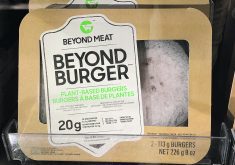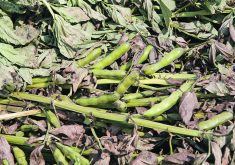Plant protein proponents hope Merit Functional Foods’ tumble into receivership isn’t heard as a death knell for canola protein’s future.
“I would say this is a company-specific problem,” said Bill Greuel, chief executive officer of the Protein Industries Canada research funding organization.
“Although it’s an unfortunate situation, I don’t think it’s indicative of a slowdown of the entire sector.”
Read Also

Bird repellent gets emergency approval for sunflowers
Bird repellent gets emergency approval for sunflowers
Related story: Failure not necessarily a disaster on the ladder to success
Merit was built during the pandemic, as global interest in plant protein soared and became one of the hottest stories in the food processing and investing industries.
A wave of plants went into construction, while many start-up companies tried to turn cutting-edge science into profitable food products. Beyond Meat burgers became a common sight on grocery store shelves and in fast-food restaurants.
However, the area has suffered significant setbacks, with some companies backing away from earlier plans to make major investments in plant protein processing, and products like Beyond Meat failing to maintain earlier growth rates. Some have suggested it was a fad and that plant proteins have a far more modest future.
Others say the problems at Merit are typical in a growing sector dominated by venture capital, start-up companies and radical new technology.
Merit is a Winnipeg company and manufacturing plant that extracts canola and pea protein and formulates it to be an ingredient for human food companies. It is partly owned by Burcon NutraScience, whose proprietary protein technologies it licenses.
On March 1, it was placed into receivership after major lenders Farm Credit Canada and Export Development Canada took the matter to court.
Merit’s CEO, Ryan Bracken, said the company’s financial failure was because of insufficient cash flow to keep operating as is, despite a steady growth in production and sales of its products.
“This means the end to Merit as it stands today,” said Bracken in a statement on LinkedIn.
“Merit was founded in 2019 with the goal of enabling the next generation of plant-based food and beverages. Sadly, while our proteins have been formulated into countless products globally, we couldn’t quite get to the level of cash flow needed to operate the business profitably, quick enough.”
Burcon has announced plans to try to keep the plant operating and to take control of Merit.
“If our funding plans are successful, Burcon could have for the first time in its history a chance to own its destiny,” said Burcon CEO Kip Underwood in a statement to shareholders.
“We could have the opportunity to develop, produce and market our innovative products. We expect the process and negotiations with Merit’s existing lenders to take several weeks. We are working with both the Merit team and lenders to ensure that the ongoing business operations continue without disruption.”
Greuel, whose organization has been channelling hundreds of millions of government dollars to plant protein and food companies, sees the problems as typical of the problems start-ups often face.
“Any time that an industry is growing from the ground up and starting where Canada’s plant-based food sector is, it demonstrates the challenges and issues related to growing the sector,” said Greuel.
PIC funded about $10 million of research involving commercializing Merit products but was not a lender to the company.
Dozens of products have incorporated Merit’s ingredients. Nearby, the much-larger Roquette pea protein plant in Portage la Prairie has been supplying many major food companies with ingredients.
“I truly believe the fundamentals that underpin the growth of the sector, which is a growing global population, consumers valuing plant-based foods for their health benefits, for the animal welfare benefits, for the environmental benefits…. All of that stuff is still extremely relevant and we’ve got other organizations that are still commissioning plants, being successful, selling products and making investments,” said Greuel.
While Merit is a comparatively small company, its ability to produce food ingredients from canola protein is unique. Canola protein meal is generally discounted compared to other meals such as soybean meal. Due to digestibility issues for most livestock, it is typically sold as a feed ingredient for dairy cattle, which do well with canola meal, or as a discounted minor feed ingredient for other animals.
Turning canola meal into a valuable food product would open a new market that would boost the value of prairie farmers’ most important crop.
“If we can move that up to human food consumption, and higher value markets such as monogastrics and the aquaculture sector, that’s a really good day,” said Greuel.
“I’m quite certain it’s good assets and it’s a good technology.”
The Canola Council of Canada, a long-time promoter of canola meal and canola protein, would not comment on the implications of the Merit situation.
Farm Credit Canada also declined to comment.
Many of the world’s leading food companies have invested in plant protein as a “meat alternative.” Tyson Foods invested in Impossible Foods, which is producing a competitor for Beyond Meats products.
Canada’s Maple Leaf Foods also invested in plant-based protein production, but scaled back that wing of the company last summer after seeing consumer demand weaken.
Much research and development is ongoing. Lab meats, which will more closely resemble steak and muscle cuts than burgers and sausage, are in development. Egg replacements are already in production.
Oat milk has become a major market success, with steady growth and bullish projections for future growth.
Plant protein “cheese” offers another area proponents believe is primed for a non-animal protein alternative.
Food industry analyst Sylvain Charlebois of the Agri-Food Analytics Laboratory at Dalhousie University said financial problems with Merit shouldn’t put off farmers and agriculture investors.
“We should never be afraid of failure. The agri-food industry is a challenging business,” said Charlebois. “Everyone should take a minute to appreciate that.”


















